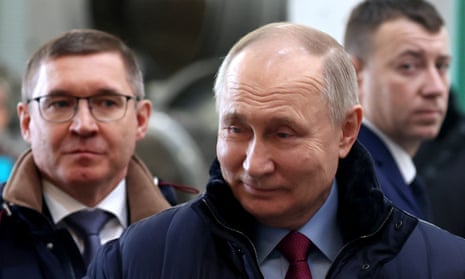Vladimir Putin smiled and looked unusually festive on Friday as he praised factory workers and joked with state reporters at an industrial plant in the Ural city of Chelyabinsk.
Putin’s confidence was unmistakable – a sign of his full belief that he would get away with the death that day of his biggest critic in jail while outlasting Ukraine on the battlefield.
The world might never know what specifically happened on the day of Alexei Navalny’s death at a remote prison above the Arctic Circle. As of Sunday, his family has not yet even been allowed to see his body.
Navalny spent years enduring some of the worst excesses of the Russian prison system. The country’s penal colonies are notorious for their grim conditions and the opposition leader was singled out for particularly cruel treatment.
Whatever the circumstances of his death, years of mistreatment support the widespread view held by his supporters that the Kremlin was responsible.
“Putin killed Alexei Navalny,” said Georgy Alburov, a Navalny ally and a researcher for his Anti-Corruption Foundation. “How exactly he did it will certainly be exposed.”
Leaders across the west similarly echoed Alburov’s view, laying the blame for Navalny’s death directly at the feet of Putin. “Make no mistake: Putin is responsible for Navalny’s death. Putin is responsible,” said the US president, Joe Biden.
But these statements are likely to leave the Kremlin shrugging its shoulders at best.
Already a wanted man after the international criminal court ruling charging him with overseeing the abduction of Ukrainians, Putin has long stopped seeking the approval of the west. As the Kremlin sees it, Putin is in the driving seat.
With the death of Navalny, he has inflicted a devastating blow to the country’s already suppressed opposition.
His control over domestic politics now appears total. After next month’s elections, he will be crowned for another six-year term as president, and his tenure could surpass even that of Soviet dictator Joseph Stalin. Putin has been in charge for 24 years so far, while Stalin died in 1953 after ruling for 29 years.
As the second anniversary of Putin’s invasion nears, Ukraine is deprived of vital aid, and cracks in morale are showing.
On Saturday, Ukraine’s army was forced to retreat from Avdiivka, a key frontline Ukrainian city, a decision that dealt Kyiv a military blow and handed the initiative of the war firmly to Putin.
In the long term, Donald Trump, who has yet to comment on Navalny’s death, has a real chance of becoming the next US president, which could give Putin a carte blanche in Ukraine and beyond.
The western plan to isolate Putin and his country, to make him a pariah and to inflict global sanctions that would cripple the Russian economy have not had their desired result.
Putin has cultivated new allies and courted the global south, receiving a grand welcome in the United Arab Emirates and Saudi Arabia, once staunch western allies.
Biden on Friday was quick to admit that after Navalny’s death it would be hard to inflict the “devastating” consequences on Russia he promised in 2021. “We’re contemplating what else could be done,” Biden said.
This hesitancy is only likely to bolster Putin’s confidence. “The more impunity Putin has, the more aggressive he inevitably becomes,” said Boris Bondarev, a former senior Russian career diplomat who defected from the Kremlin after the start of the war in 2022.
“Having destroyed opposition at home, he will focus then on those who dare speak abroad,” Bondarev warned.
This mood appears to be infectious among Putin’s allies. “Russia owes nothing to anyone – let’s start there,” Margarita Simonyan, the head of state-controlled broadcaster RT, wrote, commenting on Nato’s statement that Putin has “serious questions to answer” over Navalny’s death.
Simonyan, seemingly unfazed by the optics, continued by saying that five people who had fallen “victim” to Navalny’s anti-corruption investigations had already called her to celebrate his death.
After his killing, many fear for what is to come. “With no checks on his capacity to make fatal mistakes, an ageing Russian ruler surrounded by sycophants may embark on more reckless moves in coming years than anything we’ve seen so far,” wrote Alexander Gabuev, director of the Carnegie Russia Eurasia Center.
The prominent Russian sociologist Greg Yudin put it more grimly: “In Russia, they like to say that it is darkest before dawn. I think it’s true – it’s just that we hardly know the real darkness yet. Looks like it’s only starting to get dark. The sun is gone.”
